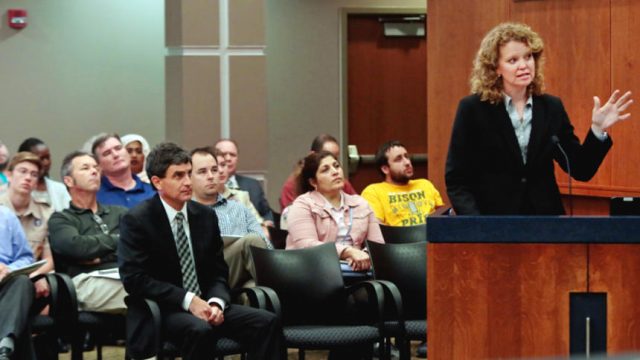We Desperately Need More Information on Refugee Resettlement in North Dakota

Jessica Thomasson, director of Lutheran Social Services of North Dakota, speaks to the Fargo City Commission Monday, Oct. 10, 2016, explaining some of the expenses and procedures of refugee resettlement in the Fargo area. Dave Wallis / The Forum
My colleague Mike McFeely had a column over the weekend which had to be catnip for a left wind audience suggesting as it does that oil workers are more dangerous than the refugees being resettled in our state (mostly in the Fargo area).
He points to a recent crime report which suggests that a surge in crime in Fargo is at least partly the result of “bad hombres” moving across the state after the oil boom in western North Dakota faded. From that McFeely manufactures a straw man about bigoted refugee haters being put out by the inconvenient truth that oil workers are more dangerous than refugees.
Or something like that.
The problem for McFeely is that he’s building his case on a lot of anecdotes.
“Criminals drawn to the state’s Oil Patch during the boom appear to be finding new opportunities in Fargo as falling oil prices caused the western economy to shrink,” the original article reports, attributing the claim to Fargo Police Chief David Todd.
That could very well be true. The oil patch brought a lot of young males to western North Dakota who had a lot of disposable income. That’s a recipe for an increase in crime, unfortunately, given what we know about the propensities of the young male demographic.
But Chief Todd’s observation is still an anecdote.
As are Todd’s comments about the impacts of refugee resettlement in the Fargo area. This is from McFeely’s column:
I asked Todd whether or not immigrants and refugees were responsible for the jump in serious crimes in Fargo, as some would have us believe.
The chief did what he always does when asked this question: He started with a disclaimer. Fargo police, he said, don’t record a person’s country of origin so that’s not something they specifically track.
But, he added, based on the information he’s gleaned from intelligence meetings, conversations with other police officers and other sources his answer is no, refugees and immigrants aren’t responsible for Fargo’s higher crime rates any more than any group of residents.
“Not disproportionately. Not any more than any other population, proportionally,” he said. “Every population has a percentage of people who commit crimes. From the information available to me, the refugee and immigrant population does not have a higher percentage of criminals than other groups.”
Chief Todd, to his credit, is doing his best to answer the question. He’s saying that per the information available to him, the refugee population in Fargo is not a disproportionate contributor to the city’s crime problems.
Maybe that’s true. The problem is the information he’s basing it on. As the Chief himself acknowledges, this isn’t something his department tracks specifically.
Meaning he’s supposing.
This lack of hard data has been the frustration of many, including observers such as myself who are not at all against refugee resettlement. It’s all the more frustrating given how bitterly the political left in our state has fought any attempt to fill in the information gaps.
[mks_pullquote align=”right” width=”300″ size=”24″ bg_color=”#ffffff” txt_color=”#000000″]Nobody is denying that the oil boom had negative side effects for North Dakota. In fact, our state leaders spent a lot of time and money on measuring the scope of that problem and addressing it. So why can’t we treat the refugee resettlement issue the same?[/mks_pullquote]
Down in Bismarck there is legislation – HB1427, introduced by Rep. Chris Olson (R-West Fargo) – which would, in its present form, study the social impacts of refugee resettlement in our state. When that bill was debated on the floor of the state House, Rep. Olson was scolded as a sort of bigot by one Democratic lawmaker.
“It was conceived in ignorance and fear, and born in prejudice and suspicion,” a visibly angry Rep. Mary Schneider (D-Fargo) said (video). “The study is given life from a mean spirited bill, and it guarded that nature in its current form. It’s designed to look for and report only the negatives.”
But there is value in studying the issue as another Democratic lawmaker – Rep. Kathy Hogan who is from the same district as Schneider, ironically enough – pointed out.
“I think the study is very, very important,” Hogan said, noting that the Legislature initiated a similar study nearly a decade ago which resulted in the state providing more funds for English language classes.
Which brings me back to McFeely’s column. It’s pretty shallow stuff. Nobody is denying that the oil boom had negative side effects for North Dakota. In fact, our state leaders spent a lot of time and money on measuring the scope of that problem and addressing it.
So why can’t we treat the refugee resettlement issue the same? Why is it so evil to study the social impacts of bringing hundreds of refugees into communities like Fargo every year?
Right now so much of the debate over refugees is based on ideology and suppositions. It seems to me that hard data, from unbiased sources, would help lift this debate out of the gutter so that we could maybe get on to solving actual policy problems instead of throwing around accusations of racism and bigotry.
Olson’s legislation is before the state Senate right now, awaiting a recommendation from the chamber’s Political Subdivisions Committee. I’m told Senators may kill the bill.
I hope not. We desperately need the information.




